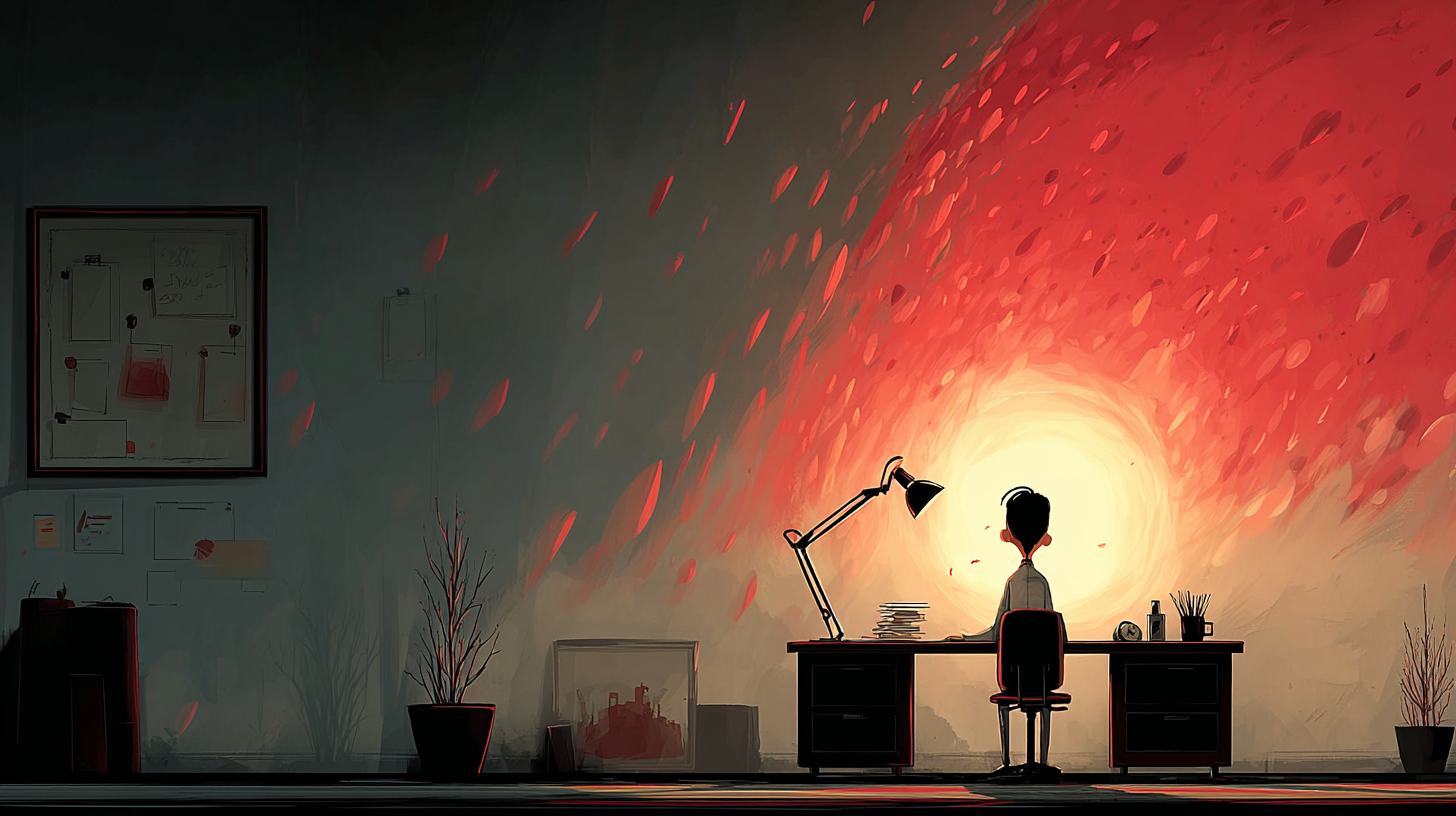Shadow means “a dark shape made by blocking light” or “to secretly follow someone.”
shadowは「光をさえぎってできる暗い形」や「こっそりついていくこと」を意味します。
以下は英単語 “shadow” に関するストーリー型学習コンテンツです。まずは大枠の意味を理解して最後の文章で確認しましょう。
主な意味(main meaning)
| 品詞 | 発音記号 (IPA) | 意味(簡潔) | 英語例文 |
|---|---|---|---|
| 名詞 (noun) | /ˈʃædoʊ/ | 光を遮ったときにできる暗い形 | The tree cast a long shadow on the ground. |
| 動詞 (verb) | /ˈʃædoʊ/ | 影のようについていく、見えないように追う | The detective shadowed the suspect all day. |
語源(etymology)
「shadow」は古英語 sceadu(shade=影、日陰)に由来し、「光を遮ることでできる暗い形」というイメージが核にあります。そこから「見えないように付きまとう」という意味も派生しました。
類義語(synonyms)
| 類義語 | 意味 | 例文 |
|---|---|---|
| shade | 日陰、光を遮ること | We sat in the shade of the big umbrella. |
| silhouette | 輪郭、影絵のような形 | I saw her silhouette against the sunset. |
| darkness | 暗さ | The room was filled with darkness after the lights went out. |
| ghost | 幽霊、影のような存在 | People said they saw a ghost in the old house. |
反義語(antonyms)
| 反義語 | 意味 | 例文 |
|---|---|---|
| light | 光 | The bright light removed all shadows from the room. |
| brightness | 明るさ | Her smile brought brightness to the dark evening. |
コロケーション(collocations)
| コロケーション | 例文 |
|---|---|
| cast a shadow | The tall building cast a shadow over the park. |
| live in the shadow of | He always lived in the shadow of his famous brother. |
| a dark shadow | A dark shadow appeared at the end of the hallway. |
| shadow of doubt | There was no shadow of doubt about her honesty. |
2項表現(binomials)
| 2項表現 | 例文 |
|---|---|
| light and shadow | The artist played with light and shadow in the painting. |
| hopes and fears | Our hopes and fears cast shadows on our future. |
英語ストーリー(english story)
The Shadow in the Office
It was a late evening in the office. Most employees had already gone home, but Ken, a young clerk, was still working on his report. The tall buildings around the office cast a long shadow (shadow=影) into the room, and the only light came from his desk lamp. Ken felt a little nervous because he thought he saw something move in the corner. It looked like a silhouette (silhouette=輪郭、影絵のような形), but when he turned around, nothing was there.
Ken tried to focus on his work, but he could not get rid of the strange feeling. “Am I just imagining things?” he thought. Still, he remembered the detective novels he liked to read, where someone always shadowed (shadow=こっそりつける) another person to find the truth. “Maybe I’m the one being followed,” he laughed quietly, though his hands were shaking.
The next morning, he told his colleague Mari about what had happened. Mari said, “Maybe you were just tired. But sometimes people really feel like they are living in the shadow (shadow=影) of their worries.” Ken nodded. “Yes, maybe I’m just stressed.” Mari smiled and said, “There is no shadow of doubt (shadow of doubt=疑いの影) that you are a hard worker.”
Later that week, the office organized a small art exhibition. A local artist displayed paintings that played with light and shadow (light and shadow=光と影). Ken stood in front of one painting. It showed a person standing in both brightness and darkness. “It reminds me of my own life,” Ken thought. “Sometimes I am full of hope, and sometimes full of fear. But both hopes and fears (hopes and fears=希望と恐れ) are part of who I am.”
Mari joined him and said, “You see? Darkness is not only something scary. Without it, we cannot see brightness.” Ken smiled. The feeling of fear slowly disappeared. He realized that the shade (shade=日陰) of a tree, the darkness (darkness=暗さ) of a room, or even the shadow (shadow=影) of a building were not enemies. They simply reminded him that light was always near.
From that day, whenever Ken felt nervous about his work or life, he remembered the painting. He understood that even in the darkest shadow, there was always a chance for light (light=光) and brightness (brightness=明るさ).
和訳
オフィスの影
オフィスの夜遅く、ほとんどの社員はすでに帰っていたが、若い事務員のケンはまだ報告書を作っていた。周りの高いビルが部屋に長い**影 (shadow=影)を落とし、机のランプだけが光を放っていた。ケンは隅に何かが動いたように見えて少し不安になった。それは輪郭 (silhouette=輪郭、影絵のような形)**のようだったが、振り向くと何もなかった。
ケンは仕事に集中しようとしたが、奇妙な感覚が消えなかった。「ただの思い込みかな」と思った。それでも、彼は好きな推理小説を思い出した。そこではいつも誰かが他人を**こっそりつける (shadow=こっそりつける)**のだ。「もしかして俺がつけられているのかも」と小さく笑ったが、手は震えていた。
翌朝、同僚のマリに話すと、マリは言った。「ただ疲れていただけじゃない?でも、人はときどき心配の**影 (shadow=影)の中で生きているって感じるものよ。」ケンはうなずいた。「そうだな、たぶんストレスだろう。」マリは笑って「あなたが努力家だということには疑いの影 (shadow of doubt=疑いの影)**はないわ」と言った。
その週、オフィスで小さな美術展が開かれた。地元の画家が**光と影 (light and shadow=光と影)を使った絵を展示した。ケンはその絵の前に立った。それは明るさと暗さの両方に立つ人を描いていた。「まるで自分の人生みたいだ」とケンは思った。「希望に満ちるときもあるし、恐れに満ちるときもある。でも希望と恐れ (hopes and fears=希望と恐れ)**はどちらも自分の一部なんだ。」
マリが隣に来て言った。「わかるでしょ?暗さは怖いものだけじゃないの。暗さがあるから、明るさが見えるのよ。」ケンは笑った。恐怖の感覚はゆっくり消えていった。彼は、木の**日陰 (shade=日陰)も、部屋の暗さ (darkness=暗さ)も、ビルの影 (shadow=影)**も敵ではないと気づいた。それらは光がすぐ近くにあることを思い出させてくれるだけだった。
その日から、ケンは仕事や生活で不安を感じると、あの絵を思い出した。彼は理解した。どんなに暗い**影 (shadow=影)の中にも、必ず光 (light=光)や明るさ (brightness=明るさ)**へのチャンスがあるのだと。
Q&A
Q: shadow と shade の違いは?
A: shadow は「物の形によってできた影」で、輪郭がはっきりしています。
shade は「太陽光を遮ってできる日陰」で、必ずしも形が明確ではありません。たとえば、木の下で涼むときは shade を使います。
Q: shadow と silhouette の違いは?
A: shadow は地面や壁などに映る暗い形全般を指します。
silhouette は「光を背にしたときに見える黒い輪郭」で、背景の光との対比で浮かび上がる「形そのもの」を強調します。
Q: shadow と darkness の違いは?
A: shadow は「何かの物体によって光がさえぎられてできた部分」です。
darkness は「光がまったくない状態」そのものを指します。つまり shadow は部分的で、darkness は全体的な暗さです。
Q: shadow と ghost の違いは?
A: ghost は「幽霊」や「実体のない存在」を意味し、比喩的に「影のような存在」というときもあります。
shadow は実際に光と物体が作る暗い形を指し、物理的な意味で使われます。
Q: cast a shadow と live in the shadow of の違いは?
A: cast a shadow は「影を落とす」という物理的な意味です。
live in the shadow of は「誰かに隠れて目立たない」や「劣等感を感じる」という比喩的な意味で使います。
Q: shadow of doubt と普通の doubt の違いは?
A: doubt は「疑い」全般を表します。
shadow of doubt は決まり文句で、「ほんの少しの疑いもない」という強調表現です。
Q: light and shadow の表現は単に「光と影」ですか?
A: 基本はその通りですが、比喩的に「明暗両面」「良い面と悪い面」という意味でも使われます。芸術や文学でよく見られる表現です。
Q: hopes and fears はどう違いを表すのですか?
A: hopes は「前向きな期待」、fears は「不安や恐れ」を指します。
二つをセットで使うと「未来に対する気持ちの両面」を表し、心の揺れを強調します。



コメント